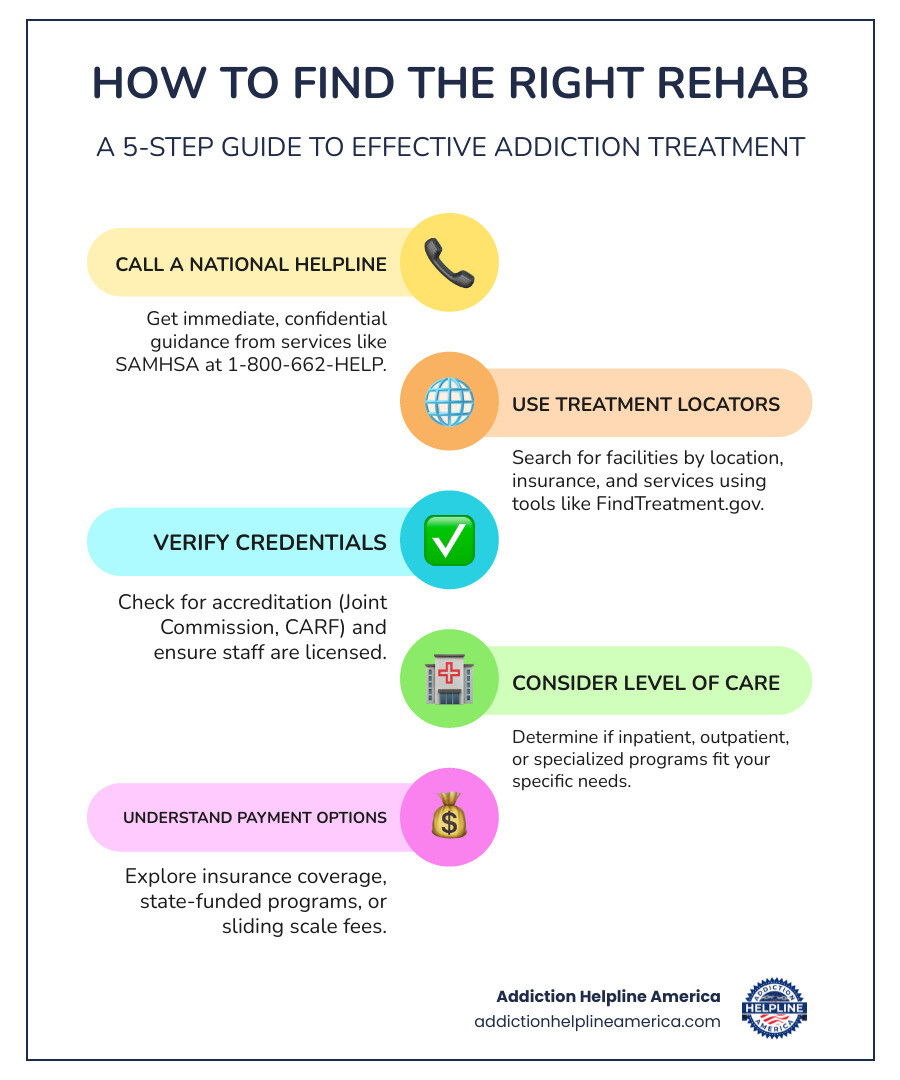
Why Finding the Right Rehab is Critical to Your Recovery
When you find a rehab that matches your specific needs, you significantly improve your chances of lasting recovery. Here’s how to start:
- Contact Addiction Helpline America for immediate, confidential guidance custom to your situation.
- Use our free treatment-matching resources to search by location, insurance, and services so you can compare options quickly.
- Verify credentials by checking for accreditation (Joint Commission, CARF) and licensed staff.
- Consider your level of care, such as inpatient (24/7 support) or outpatient (flexibility).
- Understand payment options, including insurance, state-funded programs, or sliding scale fees.
The need for effective addiction treatment is urgent. In 2021, 46.3 million Americans aged 12 or older had a substance use disorder, according to data from the National Institute on Drug Abuse. Of the 54.6 million who needed treatment in 2022, only about 13.1 million received it, revealing a massive treatment gap. For more context on nationwide trends and statistics, see NIDA’s overview of drug use trends.
Whether for yourself or a loved one, the decision to find a rehab is overwhelming. You’re not alone, and help is available. The challenge is finding the right rehab among the 14,500+ facilities in the U.S. Factors like location, cost, and treatment philosophy all matter when you’re in crisis.
At Addiction Helpline America, we help individuals and families steer this critical decision. Our experienced specialists provide compassionate, confidential support to help you find a rehab that truly fits, because the right facility can mean the difference between relapse and recovery.
Find more about find a rehab:
Understanding Your Treatment Options
When you’re ready to find a rehab, you’ll find that treatment is not a one-size-fits-all solution. Addiction treatment is a continuum of care, with different levels of support to meet you where you are in your journey. The key is understanding what’s available to make an informed choice.
Detoxification is often the first step, safely clearing substances from your body under medical supervision. Professional detox is crucial, as withdrawal from substances like alcohol or benzodiazepines can be dangerous. Medical staff manage symptoms and keep you safe. Our Detox Near Me Guide explains what to expect.
Inpatient rehab (residential treatment) involves living at a facility for 30-90 days or more. It provides structure, 24/7 support, and distance from daily triggers, allowing you to focus entirely on recovery.
Partial Hospitalization Programs (PHP) offer intensive treatment during the day while you live at home, providing a high level of care with more flexibility than an inpatient program.
Intensive Outpatient Programs (IOP) are a step down, with meetings a few hours a day, several days a week. This works well for those transitioning from a higher level of care or needing more support than standard outpatient.
Outpatient rehab (OP) is the most flexible option, allowing you to attend therapy while maintaining your job and family life. It requires strong self-discipline and a supportive home environment.
Inpatient vs. Outpatient Treatment
Choosing between inpatient and outpatient care is a major decision when you find a rehab. Residential treatment offers total immersion in recovery, removing you from your daily life to live at a facility with 24/7 support. It’s ideal for severe addiction, co-occurring mental health issues, or an unsupportive home environment. For some, Long Term Alcohol Rehab in a residential setting is essential.
Outpatient treatment allows you to live at home and attend scheduled therapy sessions. This flexibility lets you maintain work and family responsibilities while applying recovery skills in your real-world environment. It’s best for milder addiction, those with strong home support, or as a step-down from inpatient care.
Here’s how they compare side by side:
| Feature | Inpatient Rehab | Outpatient Rehab |
|---|---|---|
| Environment | Residential facility, 24/7 supervision | Live at home, attend sessions |
| Intensity | High, immersive, structured | Moderate to high, flexible |
| Medical Care | Constant medical and psychiatric support | Scheduled medical appointments, less immediate |
| Cost | Generally higher | Generally lower |
| Flexibility | Limited, focus solely on recovery | High, allows continuation of daily life |
| Support System | Built-in community at the facility | Relies on home support system and program peers |
| Ideal For | Severe addiction, co-occurring disorders, unstable home | Milder addiction, strong home support, step-down care |
Specialized Treatment Programs
As you find a rehab, look for programs designed for specific populations, as this can significantly improve outcomes.
- Dual diagnosis treatment addresses both substance use and mental health conditions (like depression or anxiety) simultaneously.
- Faith-based rehab integrates spiritual principles into recovery, often at low or no cost.
- Teen rehab offers age-appropriate therapies, educational support, and family involvement. Our Teen Rehab Near Me resource can help.
- Gender-specific programs for men or women create safe environments to discuss sensitive issues and foster deeper connections.
- Luxury rehab provides high-end amenities like private rooms, gourmet meals, and holistic therapies for added comfort and privacy.
Medication-Assisted Treatment (MAT)
Medication-Assisted Treatment (MAT) combines FDA-approved medications with counseling to treat substance use disorders, particularly for opioid and alcohol addiction. The medications help stabilize brain chemistry, reduce cravings, and ease withdrawal, allowing you to focus on therapy.
For opioid addiction, medications like buprenorphine and methadone prevent withdrawal, while naltrexone blocks the euphoric effects of opioids. For alcohol use disorder, naltrexone, acamprosate, and disulfiram help reduce cravings and deter drinking. MAT is most effective when integrated with counseling and behavioral therapies.
To learn more, read our guide on What is Medication Assisted Treatment?. When you’re ready to find a rehab with MAT, we can help you connect with providers, including options to Find Buprenorphine Practitioners.
How to Find a Rehab and What to Expect
The journey to find a rehab doesn’t have to be overwhelming. At Addiction Helpline America, we connect people to treatment centers nationwide, offering free, confidential guidance to help you find a qualified program that fits your needs.
When searching, look for proper accreditation from organizations like The Joint Commission or CARF. These credentials prove a facility meets high standards for quality care and safety. Also, verify that the staff includes licensed professionals like doctors, counselors, and therapists. You can also use reputable national and state directories to broaden your search.
Key Factors to Consider When You Find a Rehab
Taking time to evaluate your options is crucial. Our guide on Choosing the Right Rehab Facility offers more detail, but here are the key factors:
- Location: Decide if staying close to home for family support or seeking distance from triggers is better for your recovery.
- Cost and payment options: Honestly assess what you can afford. We’ll cover insurance, state funding, and other options in the next section.
- Treatment philosophy: Find a program that resonates with you, whether it’s 12-step, cognitive-behavioral therapy (CBT), or a holistic approach.
- Amenities and environment: A peaceful, supportive environment can help you focus on healing. Amenities range from basic to luxury.
- Staff-to-patient ratio: A lower ratio means more individualized attention from staff.
- Aftercare planning: Quality programs provide robust aftercare, including connections to sober living, support groups, and relapse prevention strategies.
- Specialized needs: If you need dual diagnosis care or have specific cultural or gender needs, find a program that can accommodate them. We can help you Find Treatment for Mental and Substance Use Disorders.
The First Steps: Detox and Intake
Once you choose a facility, the process begins with detox and intake.
Detoxification is the medically supervised process of clearing substances from your body. Professional supervision is critical, as withdrawal from alcohol and benzodiazepines can be life-threatening, and withdrawal from other substances is uncomfortable. Medical staff can manage symptoms and ensure your safety. Our Detox Near Me Guide has more information.
The intake assessment happens during or after detox. This comprehensive evaluation of your physical, mental, and social history allows the clinical team to create a map for your recovery. Being honest during this process is key to developing effective Customized Treatment Plans.
How Long Does Treatment Last?
When you find a rehab, the length of stay depends on your individual needs. There is no one-size-fits-all timeline.
- 30-day programs provide a foundation for recovery, establishing initial sobriety.
- 60-day programs allow more time to explore the underlying issues of addiction.
- 90-day programs are often recommended by the National Institute on Drug Abuse (NIDA) for the best outcomes, as this duration gives the brain more time to heal.
- Long-term rehab (several months to a year) is best for severe or chronic addiction, often with co-occurring disorders.
Addiction is a chronic disease, and healing takes time. The best programs are guided by clinical progress, not arbitrary timelines. Many people move through a continuum of care, stepping down from inpatient to outpatient support as they gain strength.
Navigating the Costs of Addiction Treatment
The financial aspect of treatment can feel daunting when you find a rehab. Private treatment is a significant investment; for example, an inpatient plan in Alabama can average over $58,000. However, the cost of not getting treatment—in lost jobs, health crises, and legal troubles—is far greater. Treatment is an investment in your future.
Fortunately, many options exist to make treatment accessible, including insurance, state-funded programs, sliding scale fees, and payment plans. We can help you find a path forward that fits your budget, because everyone deserves a chance at recovery.
Using Insurance to Pay for Rehab
Thanks to the Affordable Care Act (ACA), most health insurance plans must cover addiction treatment as an essential health benefit. However, coverage details vary.
- In-network vs. out-of-network: In-network facilities have contracts with your insurer, resulting in lower out-of-pocket costs.
- Verifying your benefits: Always confirm your coverage. Ask the facility’s admissions team to help you understand your deductible, copayments, and any prior authorization requirements.
Our guide on Rehab Insurance Coverage provides more detail. We work with insurers in all 50 states to help you maximize your benefits.
How to Find a Rehab Without Insurance
Lack of insurance should not be a barrier to getting help when you find a rehab. Here are some options:
- State-funded programs: Every state offers publicly funded treatment services for residents with limited income. Contact your state’s behavioral health authority or department of health for a directory.
- Non-profit organizations: Many community and faith-based organizations offer free or low-cost programs. Ask about eligibility and waitlists.
- Grants, scholarships, and sliding scale fees: Many facilities offer financial assistance based on need. Always ask what is available.
- Payment plans: Some private rehabs offer in-house financing to spread out the cost.
- Medicaid and Medicare: These government programs typically cover a range of addiction treatment services for eligible individuals.
For state-specific information, check resources like our Free Rehab New Orleans Guide. At Addiction Helpline America, we help people steer these financial pathways to Find Treatment for Mental and Substance Use Disorders that fits their budget.
Life After Rehab: Building a Foundation for Lasting Recovery
Completing rehab isn’t the finish line; it’s the start of living in recovery. The months following treatment are vulnerable, and relapse rates for addiction are between 40-60 percent. However, relapse is not failure, and a strong aftercare plan dramatically improves your chances of long-term sobriety.
Aftercare is the essential bridge between the protected environment of treatment and everyday life. It continues the work you started and helps you steer challenges.
Key components of a strong aftercare plan include:
- Sober living homes: These residences provide a structured, supportive environment as you transition back to independence. They offer accountability through house rules and drug testing.
- Support groups: Groups like Alcoholics Anonymous (AA), Narcotics Anonymous (NA), or SMART Recovery provide an invaluable community of peers who understand your journey.
- Continuing therapy: Individual and group counseling helps you process challenges as they arise and keeps you grounded in your recovery.
- Relapse prevention: This involves identifying your personal triggers (people, places, emotions) and creating specific strategies to manage them before they lead to a relapse.
- Building a sober network: Intentionally surround yourself with people who support your recovery. Find new hobbies and activities that don’t revolve around substance use.
- Recovery support networks: This includes supportive family, friends, employers, and faith communities that create a resilient foundation for your new life.
At Addiction Helpline America, we stress the Importance of Aftercare in Addiction because it transforms outcomes. When you find a rehab through us, we also provide guidance on what comes next. Our Staying Sober Tips offer practical strategies for navigating life in recovery. Lasting recovery is a journey, and with the right support, it’s yours to create.
Frequently Asked Questions about Finding a Rehab
When you’re trying to find a rehab, it’s normal to have a lot of questions. We’re here to provide straightforward answers to help you move forward with confidence.
How do I know if a rehab center is reputable?
Separating quality centers from the rest is crucial. Here’s what to look for:
- Accreditation: Look for accreditation from The Joint Commission or CARF. This signifies that a facility meets high standards for safety and care.
- State Licensing: A legitimate rehab must be licensed by the state in which it operates. Don’t hesitate to ask for proof.
- Staff Credentials: The team should include licensed medical doctors, certified addiction counselors, and therapists. Reputable centers are transparent about their staff’s qualifications.
- Evidence-Based Practices: Treatment should be based on proven methods like Cognitive Behavioral Therapy (CBT) or Dialectical Behavior Therapy (DBT). Our guide on Therapeutic Approaches explains these in more detail.
- Online Reviews: Look for patterns in reviews, but don’t let them be your only deciding factor. Consistent complaints are a red flag.
Can I lose my job for going to rehab?
This fear prevents many from seeking help, but federal laws offer protection. The Family and Medical Leave Act (FMLA) allows eligible employees to take up to 12 weeks of unpaid, job-protected leave for medical reasons, including addiction treatment. Your health benefits continue, and your position is held for you.
Additionally, the Americans with Disabilities Act (ADA) protects individuals in recovery from discrimination. Employers cannot fire you or treat you differently for seeking help for a past or current addiction (as long as you are not actively using illicit drugs). Your medical information is also protected by confidentiality laws.
What should I expect during the admissions process?
The admissions process is designed to be supportive. Here’s a typical breakdown:
- Initial Phone Call: This is your chance to ask questions and share your situation with a knowledgeable and non-judgmental admissions coordinator.
- Pre-Screening: A brief conversation to ensure the facility has the right resources to help you.
- Insurance Verification: The admissions team will contact your insurer to confirm your coverage and explain any out-of-pocket costs.
- Clinical Assessment: A detailed evaluation with a licensed professional to create your individualized treatment plan. Honesty is key.
- Travel and Packing: The team can help with travel arrangements and provide a packing list of what to bring and what to leave at home.
The admissions team is there to guide you through every step. No question is too small as you take this brave first step toward healing.
Conclusion: Your Path to Recovery Starts Here
Deciding to find a rehab takes tremendous courage. By reading this guide, you’ve already taken the difficult first step of acknowledging the need for help.
We’ve covered the different levels of care, from detox to outpatient, and explored specialized programs and the role of Medication-Assisted Treatment. We’ve also steerd the costs of treatment and the importance of aftercare. The key takeaway is this: recovery is possible. Behind every statistic is a person who found their way to healing, and you can be one of them.
At Addiction Helpline America, our mission is to listen to your story and help you find a treatment center that truly fits. Whether you need a local program, one far from home, or have specific financial concerns, our free, confidential, and personalized guidance is here for you. We work with accredited centers in all 50 states and the District of Columbia, ensuring you connect with a quality program.
Don’t let addiction have another day. Rushing into the wrong program can be a setback, which is why we take the time to match you with a facility that has qualified staff and evidence-based approaches. Your future self is waiting.
You don’t have to do this alone. We’re here to help you sort through the options and take the next step.
Take the first step and find a rehab today. Your path to recovery starts with a single call, a single click, a single moment of choosing hope. We’re ready when you are.
Our helpline is 100%
free & confidential
If you or someone you care about is struggling with drug or alcohol addiction, we can help you explore your recovery options. Don’t face this challenge alone—seek support from us.
Programs
Resources
Will my insurance
cover addiction
treatment?
We're ready to help
Find the best
drug or alcohol treatment
center
Are you or a loved one struggling with addiction? Call today to speak to a treatment expert.
















